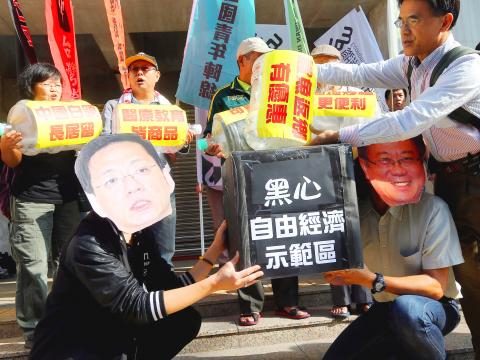|
Groups say pilot zones to increase reliance on China
BAD IDEA: Activists said proposed free economic pilot zones would open the door to problematic food products and pose a threat to local farmers’ livelihoods
By Lii Wen / Staff reporter

Activists protest outside the Legislative Yuan in Taipei yesterday as lawmakers review a draft bill for the establishment of free economic pilot zones.
Photo: CNA
A draft bill governing the establishment of free economic pilot zones has provoked resistance from opposition politicians and activists, with a coalition of civic groups protesting outside the Legislative Yuan in Taipei yesterday as the bill went under evaluation at the legislature’s Economics Committee.
Led by the Economic Democracy Union — formerly known as the Democratic Front Against the Cross-Strait Trade in Service Agreement — the protesters voiced their opposition to the policy as they watched a live broadcast of the meeting from a makeshift venue next to the legislature.
Proposed by President Ma Ying-jeou’s (馬英九) administration two years ago in a bid to boost the economy, the controversial policy proposes the creation of special territories around the country in which businesses would enjoy tax exemptions and other legal incentives in a wide range of industries — including healthcare, education, food processing, financial services and logistics.
While the government says that the zones will help attract foreign investment and increase economic growth, critics say they will increase the nation’s economic reliance on China, as well as lead to the commercialization of public services.
Referring to the ongoing food crisis, the protesters said relaxed trade regulations in the proposed pilot zones would open the door to problematic food materials, exposing Taiwanese to more tainted food products.
Carrying large water barrels to symbolize the tainted oil scandal that has swept the nation during the past month, the activists called on legislators to terminate the pending bill for the sake of the nation’s food safety.
Economic Democracy Union convener Lai Chung-chiang (賴中強) said that Article 41 of the proposed free economic pilot zone act (自由經濟示範區條例) would allow for foreign goods to enter the pilot zones without obtaining the permits required by import regulations.
Article 38 and Article 42 of the proposed act would allow foreign agricultural produce — including products from China — to enter the pilot zones free from tariffs, which would pose a grave threat to the livelihood of the nation’s farmers, because the foreign produce could be sold at lower prices, Lai added.
Several members of the Black Island National Front — one of the leading youth activist organizations during the Sunflower movement’s 23-day occupation of the legislature’s main chamber earlier this year — also expressed their opposition to the pilot zones, saying that the policy would lead to “economic unification” with China.
“On Nov. 1, Chinese President Xi Jinping (習近平) paid a visit to the Pingtan Comprehensive Experimental District (平潭綜合試驗區) in [China’s] Fujian Province, a free-trade district designed specifically to attract Taiwanese businesses,” said Tsai Yi-jun (蔡宜君), a member of the group.
“Along with a number of other free-trade zones in China, its mission is to foster more connections with the free economic pilot zones in Taiwan, thus paving the way for economic unification,” Tsai said.
Evaluation of the act was halted at noon, when Economics Committee convener Yang Chiung-ying (楊瓊櫻), a Chinese Nationalist Party (KMT) member, dismissed the meeting, citing multiple absentees among KMT legislators.
source: Taipei Times
|